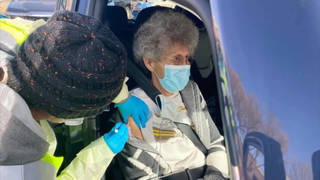
By Amy Goodman & Denis Moynihan
More than 250,000 people in the United States have died from COVID-19, by far the highest national death toll in the world. Over 1,500 people are dying here per day now — equivalent to five jumbo jets falling from the sky daily. At the pandemic’s outset, it took three months for the U.S. to hit one million cases. Now we’re seeing one million cases per week. These grim milestones mark the beginning of the Thanksgiving holiday week, which could further accelerate the spread of this devastating disease.
Thanksgiving is taking center stage in the polarized battle over our collective COVID-19 pandemic response. Public health experts are pleading with people to forgo holiday gatherings with people who live outside one’s household, while supporters of President Trump decry commonsense public health directives as “Orwellian” infringements on freedom.
North Dakota currently has the worst coronavirus infection and death rate for any nation or state on the planet. One in every 1,000 North Dakotans has already died from COVID-19. South Dakota ranks third on the list of hardest hit states. Native American communities, as with other communities of color, have been disproportionately impacted by the pandemic.
The Standing Rock Sioux Reservation straddles the border between North Dakota and South Dakota, and thus is directly impacted by the pandemic-denying policies of both Republican state governments. The pandemic “is affecting us in ways not widely known by the rest of America. We’re having a lot of people perish, a lot of death, a lot of hospitalizations,” Jodi Archambualt, a citizen of the Standing Rock Sioux Tribe and former special assistant to President Obama for Native American affairs, said on the Democracy Now! news hour.
Archambault explained tribal responses to the refusal by South Dakota Governor Kristi Noem, a staunch Trump ally, and North Dakota Governor Doug Burgum, to issue statewide mask mandates: “Reservations or tribal nations, such as Eagle Butte, the Cheyenne River Sioux Tribe and the Oglala Sioux Tribe, the Sisseton, Wahpeton, Rosebud, they’ve all implemented roadblocks to stop traffic and outsiders from coming on the reservation.” Burgum, under pressure from the explosion of infections in his state, finally implemented a limited mask mandate. Archambault explained that Noem, however, attempting to punish the tribes for the roadblocks, “has coordinated with the Trump administration to make it difficult to receive the federal resources allocated to the tribal governments.”
Farther south, the Navajo Nation is experiencing a second deadly surge of COVID-19, after suffering the country’s highest per capita infection rate last spring. Allie Young, a 30-year-old Navajo activist, said on Democracy Now!, “Some of our border towns around here are Trump territory, so there were rallies. A lot of our people come into these border towns to do their shopping. We have to travel to these territories where they’re not wearing masks.”
Allie Young organized a trail ride on horseback with the group she founded, Protect the Sacred, to get Navajo voters to the polls in Arizona. “Horse medicine is when you are in rhythm with the horse,” she explained. “You’re reconnected and refocused as you ride…reminded of exactly what our ancestors have fought for, our lands, and our cultures and also our right to vote.”
The Native American population did turn out for this election, in record numbers. In the swing states of Arizona and Wisconsin, which voted for Trump in 2016 but flipped to support Joe Biden in 2020, the native vote may have been critical. In Wisconsin, for example, Trump defeated Hillary Clinton in 2016 by just under 23,000 votes. This year, in contrast, and while Wisconsin is being ravaged by COVID-19, Biden turned that around, beating Trump by over 20,000 votes. Wisconsin-based attorney Burton Warrington, of the Menominee, Potawatomi and Ho-Chunk nations, said on Democracy Now!, “The Native vote really does have the ability, by sheer numbers and mathematics, to actually change the election here.”
Thanksgiving is predicated on the lie that the white settler colonists known as “Pilgrims” had a friendly, respectful relationship with the original inhabitants of the land they stole. This fable of an abundant shared meal shrouds the misery that consumes so many in native communities, from poverty, substance abuse, and the lack of healthcare to the epidemic of missing and murdered indigenous women. It also ignores the proud, living tradition of indigenous resistance, from opposition to fossil fuel extraction and pipelines, to, most recently, its pivotal role in defeating Trump at the polls.
After surviving genocide, violent relocation and attempts at forced assimilation over five centuries, indigenous nations on this continent are again proving themselves resilient and organized. This, even as we must avoid holiday gatherings in order to protect ourselves, our loved ones, and the public at large, is something for which to be truly thankful.












Media Options